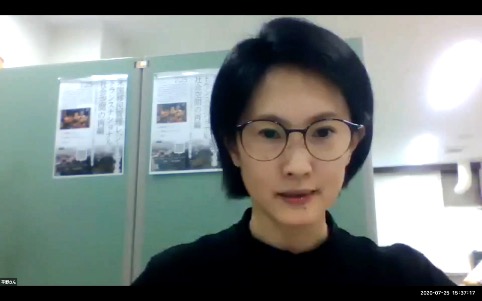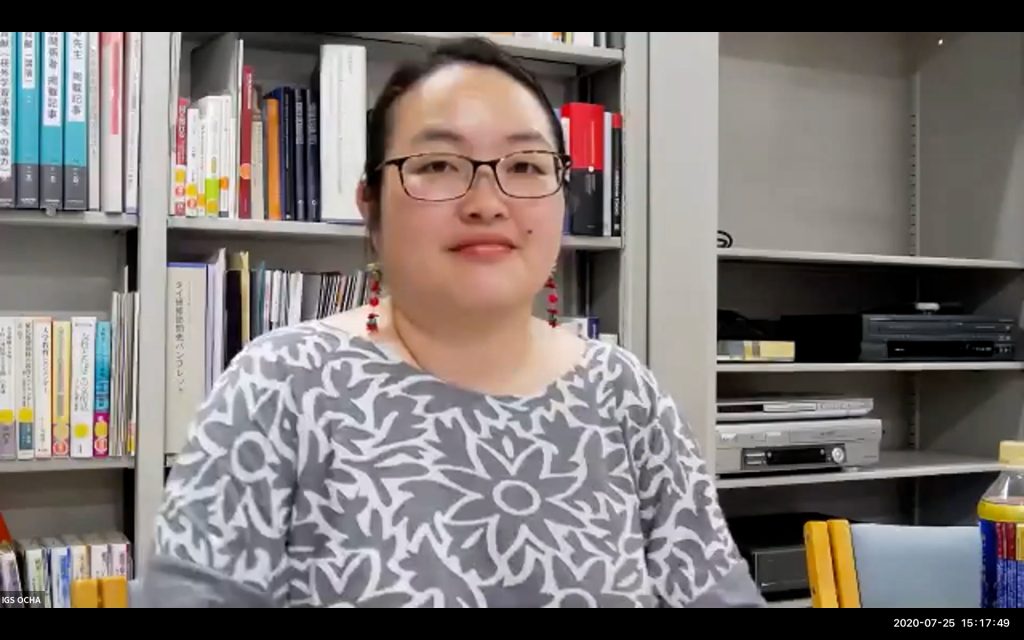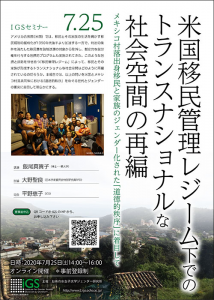【IGS Seminar】“Reorganization of transnational social spaces under the U.S. immigration regime”
In Dr. Iio’s presentation at this seminar, she introduced a suggestive study on the way gendered practices based on the prevailing moral order were exercised during migration processes, focusing especially on immigrants moving between the U.S. and rural Mexico. Since the 2000s, deportation studies have been conducted primarily from the point-of-view of host countries and the impact of migrations on countries of origin remains unclarified. This one-sided scholarly stance has resulted in the generation of indifferences toward people who are pushed back to their countries of origin by the immigration control regime, which should ideally incorporate both inclusionary and exclusionary aspects. She has conducted several fieldworks both in Mexico (2015–2018) and in the U.S. (2017–2019). Her presentation highlighted the need for transnational perspectives to overcome the unequal tendencies exhibited by previous studies. Her interests encompass the full gamut of the immigrant experience: the variances in the circumstances migrants confront in the host country because of their socio-cultural status in their country of origin, the travails of migrations, and how immigration control regimes affect the existing afflictions of migrants as they drive a transnational reformulation of social space.
The immigration control regime is an indispensable component of the immigrant experience. Her presentation showcased two characteristic aspects of this regime. First, the late 1990s evinced an institutional shift toward a more stringent regulation of immigrants. Citing anti-terrorism and security as reasons for stricter control, the regime’s policies nevertheless appeared to be geared toward an attempt to exclude a few particular groups of people: migrants from Latin America, especially Mexico. In fact, deportations to Mexico represented 66% of the total figures in the U.S. between 2003 and 2016. Second, the statistics also evidence the racialized and gendered practices of this regime. In the context of gender, the percentage of deported men had been always much higher than women. Therefore, in this biaxial configuration, the immigration control regime of the U.S. seems to increasingly target Latin American, working-class, immigrant men. On their part, immigrants also seem to internalize those biases. Dr. Iio Makiko alluded to some narratives she collected by her fieldworks to exemplify this internalization: reported attempts to be “a good man,” expressions of fidelity toward the legal system, and a dichotomous manner of self-apprehension that appeared to reflect some of the regime’s attitudes, such as men are bad and women are good.
After describing the circumstances that confront immigrants in their host nation, the next segment of the presentation pertained to their rural origins in their home country. This section elucidated two social systems specific to the Mexican context: the cargo system, and the list of deaths. Although social norms are subject to change and reform over time, Dr. Iio discovered discrete attitudes toward these systems within the Mexican village communities she studies. These disparities cannot solely be explained through the contention of generational differences. She explained that the mobilities between the U.S. and Mexico diverged in their characteristics. Her presentation title alludes to the transnational reformation of social space evidenced in the context of the Mexico-U.S. migrations. In one sense, such reorganizations could be interpreted as norms that absorb the beneficial aspects of both sides; in another sense, however, there exists a reality in which the definition of “good” is never unanimous. The differential standards pertaining to gender emerge when processes applied by the moral orders of both U.S. and the Mexican villages are scrutinized. For example, the U.S. immigration control regime utilizes particular discourses to purposefully downgrade men. Their stance tends to criminalize the immigrants and suggest that the migrant men are “bad,” influencing attitudes to a certain degree and preparing the foundation of dividing the people who return from the U.S. into “good” and “bad” elements. This dichotomous image of men subsequently becomes a criterion that also applies to the evaluation of women. Rejecting such limited perspectives and reimagining transnational standpoints, Dr. Iio’s presentation elucidated forms of inclusion and exclusion as well as aspects of moral standards and gender norms that cannot be extracted unless two different social contexts are taken into account.
During the discussions that followed the presentation, the commentator Dr. Sera Ono illuminated three principal points. First, she focused on the asymmetry postulate of the deportation system that was divided by gender. Second, she reflected on the form of resistance evinced by women against one of the village systems, the list of death. Third, she asked important questions that were valid for every woman engaged in any kind of field study: What does it mean to keep listening to immigrant voices when one is faced by the double-faceted truth of being a researcher who is “foreign,” “young,” “female,” and a “graduate student?” Could these elements make the researcher more vulnerable to “noise” during field investigations? Could the researcher’s own existence become “noise” for village inhabitants in other lands?
 |
 |
Reported by Moeko Nagai
Ph.D. student, Ochanomizu University
|
《Event Detail》 【Date/Time】Saturday, 25 July, 2020, 14:00-16:00(JST) |


